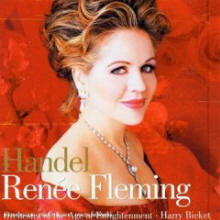|
You are reading the older HTML site Positive Feedback ISSUE march/april 2008
Handel
Arias, Renée Fleming, soprano; Orchestra of the Age of Enlightenment/Harry Bicket. Decca B003160-02. TT: 70.20. Semele: Oh sleep, why dost thou leave me?; Endless pleasure. Scipione: Scoglio d'immota fronte. Orlando: Quando spieghi i tuoi tormenti. Serse: Ombra mai fu. Samson: To fleeting pleasures make your court; Let the bright Seraphim. Rinaldo: Lascia ch'io pianga; Dunque, i lacci d'un volto; Ah, crudel! Giulio Cesare: V'adoro, pupille; Da tempeste il legno infranto. Rodelinda: Ritorna, o caro e dolce mio tesoro. Lotario: Sommo rettor del cielo...D'una torbida sorgente. Agrippina: Pensieri, voi mi tormentate; Bel piacere è godere fido amor! Alexander Balus: Calm thou my soul... Convey me to some peaceful shore. This program allows Renée Fleming to explore Handel beyond the relatively limited opportunities afforded her by the Met, and there's much to enjoy in it, even if the results aren't quite as consistently fine as one had hoped. The Italian arias, which constitute the greater part of the program, elicit Fleming's best performances, especially the faster numbers where the drive and energy spur her to a bracing, galvanic vigor. If she doesn't quite have the every-note-in-place ease of a Sutherland in the fioriture—the dog-chasing-its-tail figuration in the "B" section of Ah! crudel flusters her slightly—she throws herself into them with spirit, sporting effective embellishments on the da capo repeats, and the sound and sense of all those notes comes through. Fleming's response to the slower arias—Lascia ch'io pianga, say, and Ombra mai fu—is more purely musical than "dramatic." She sings them with a handsome legato, but seems rarely to connect directly with the text—the repeated, heartfelt "pietà" in Ah! crudel being a conspicuous exception—contenting herself with setting a generally suitable tone, which occasionally misses the intended mark. In the context of a complete Giulio Cesare, for example, it's not immediately clear that V'adoro, pupille would best be served by a posture of unwavering dignity. Still, letting the music and the voice do the work is hardly a bad strategy in Handel, and the vocal results are pleasing. The English arias are generally less impressive, perhaps even a bit careless. Swallowed final consonants and, sometimes, occluded vowels blur Fleming's enunciation of some phrases, but in others she shallows out some of the open vowels—the recurring "why" and "joys" of Oh sleep, why dost thou leave me?, for example. When Fleming makes a point of articulating, the results can be mannered, as with her recurring breathy rendering of "endless" in Semele's Endless pleasure—so fast it practically scampers—which not only breaks the line but violates the style. She brings a nice lift to Let the bright Seraphim, but self-consciously overdoes the holding back on "their loud uplifted [angel trumpets blow]." (I've never understood that particular "tradition," anyhow—just get on with it in tempo, for heaven's sake!) In fairness, Samson's To fleeting pleasures make your court is a pleasure, but too short. And, while Fleming sustains a lovely line and mood in the Alexander Balus piece, it peters out rather than really finishing, ending the program inconclusively. Harry Bicket infuses the more vigorous arias with plenty of thrust, and keeps things flowing in the lyrical ones. The full-toned orchestral accompaniments, sufficiently weighty and grounded, recall the halcyon days of London-based chamber-orchestra Handel. Oddly, however, the 'cellist's phrasing in Oh sleep, why dost thou leave me? is wooden—I had the same complaint about the player on Ruth Ann Swenson's Handel/Mozart disc (EMI CDC 7243 5 56672 2 9). Lovely sound reproduction, although the opening "Pensieri" of the first Agrippina aria betrays the voice's unnecessarily close miking.
|

